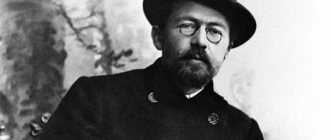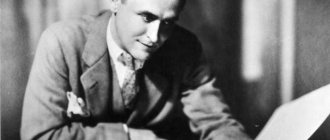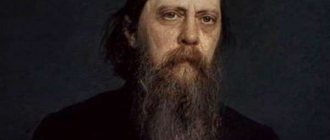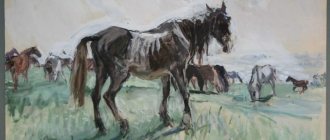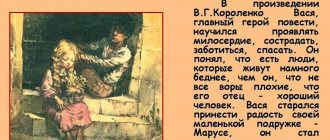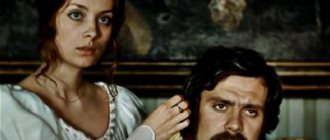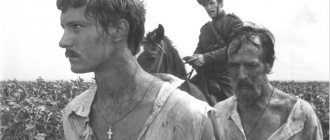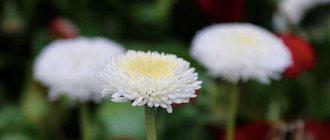“Pantry of the Sun”: summary
“The Pantry of the Sun” is a unique example of a fairy tale, the genre of which was developed by Mikhail Mikhailovich Prishvin. The work closely intertwines human destinies and nature, which does its best to help the little heroes. In fact, trees, a swamp and the sun are full-fledged characters that have a lively and interesting appearance.
The work “The Pantry of the Sun,” a brief summary of which is presented to the reader, is a story about the power of the harmonious connection between man and nature. The story is that you can overcome any adversity by acting according to your conscience and listening to your heart. The story is that man is the pinnacle of evolution, but only when he lives in harmony with everything that surrounds him.
This idea is substantiated in the story by Mikhail Mikhailovich Prishvin. “Pantry of the Sun”, a brief summary of which is presented according to the main stages of the plot, describes the following events:
Exposition
The colorful and vibrant introduction doesn't start out like a classic fairy tale. Instead of the standard “once upon a time,” the reader unfolds the story of two orphans:
- Their mother died without recovering from the disease, and their father died a heroic death on the fields of World War II.
- Nastya and Mitrasha first lived under the supervision of neighbors, and then learned to lead their own lives.
The beginning
A brief retelling of “The Pantry of the Sun” should begin from the moment the children go to the forest. Every year, at the end of the February cold, people went into the forest to pick cranberries. After lying under a warm blanket of snow, it became much sweeter and healthier. Nastya and Mitrasha also decided to go to Palestine, which their father told them about:
- the girl did not forget to grab bread, some milk and potatoes for a snack;
- Mitrash, like a real man, took with him a basket and a compass to find the right path.
The image of Mitrasha in the illustration by E. Rashchin: YouTube / MyBook
On the way, the boy told his sister about the Bludov swamp - a terrible place that had a bad reputation. Having reached a fork with a stone, the children separated and went along different paths. Nastya along the common road, and Mitrash along an unexplored path to the north.
Climax
So, “Pantry of the Sun” in short. If you describe the most important events, then you need to mention the climax of the fairy tale. The author helps the reader observe two characters:
- The dog Travka follows Nastya. Previously, the dog served the local forester, but after his death he remained to live in the forest, howling occasionally, yearning for his owner. Having smelled the food in the girl’s basket, Grass went after it. The Gray Landowner, a wild wolf living on the hill, came running to the howl of Grass;
- Mitrash wandered along the roads until he reached the swamps. By the way, it is here that the reader finds the answer to the question, what is the sun's pantry? People called this place “the pantry of the sun” because peat was stored there for years. Deciding to take a shortcut, the boy walked straight through the muddy clearing and soon found himself in a quagmire.
At this moment, the reader’s tension increases, and anxiety for the children and lack of focus only intensifies the tension.
Denouement
Nastya continued to collect cranberries and had no idea what kind of trouble her brother was in. Having called out to him a couple of times and hearing only silence in response, the girl suspected something was wrong and was very upset.
The child’s bitter tears forced Grass to go in search of the boy, and the dog’s sensitive scent led her to the swamp. Grass saw a child stuck in a quagmire, came closer to him and allowed him to grab his hind legs. Then the dog rushed with all his might and helped the child get out of the swamp trap. Mitrasha was saved.
At this time, Travka picked up the trail of the hare and chased him, and Mitrasha went after her. He understood that dusk was already falling on the forest and he and his sister needed to spend the night right here. Following the dog, the boy follows the trail of the Gray landowner and kills the dangerous predator. Nastya comes running at the sound of the shot, the guys have dinner, and in the morning they return to the village together.
The short story “The Pantry of the Sun” is a quick read. The plot of the work holds the reader’s attention, forcing him to turn page after page in order to quickly find out the ending of the work “The Pantry of the Sun”. Prishvin has said more than once that he considers this creation not just a fairy tale, but an ode to the strength of the human spirit, an ode to endurance, friendship, courage and mutual assistance.
“Pantry of the Sun” summary by chapter
“Pantry of the Sun” a summary of the chapters of Prishvin’s fairy tale can be read in 10 minutes. You can also check out the retelling of “The Pantry of the Sun”
“Pantry of the Sun” summary by chapter
1
“In one village, near the Bludov swamp, near the city of Pereslavl-Zalessky, two children were orphaned. Their mother died of illness, their father died in the Patriotic War.”
The children were very nice. “Nastya was like a Golden Hen on high legs. Her hair... shimmered with gold, the freckles all over her face were large, like gold coins... Only one nose was clean and looked up.
Mitrasha was two years younger than his sister. He was only about ten years old. He was short, but very dense, with a big forehead... He was a stubborn and strong boy.
“A little man in a bag,” the teachers at school called him smiling among themselves.”
“After the parents, their entire peasant farm went to the children: the five-walled hut, the cow Zorka, the heifer Dochka, the goat Dereza, nameless sheep, chickens, the golden rooster Petya and the piglet Horseradish.”
All the neighbors tried to help the orphaned children, but they themselves managed the household well. Moreover, they helped in all public works.
The children lived together. Nastya was busy with the housework, and Mitya took on “all the peasant work” and learned how to hew wooden utensils - and they willingly took them from him. They thanked me kindly. II
“The sour and very healthy cranberry berry grows in swamps in the summer and is harvested in late autumn. But not everyone knows that the best, sweetest cranberries, as we say, happen when they have spent the winter under the snow.”
Mitrasha and Nastya gathered for cranberries. “Even before daylight, Nastya gave food to all her animals. Mitrash took his father’s double-barreled Tulku shotgun, decoys for hazel grouse, and did not forget the compass.”
His father once explained to him what the arrow was for.
Nastya takes a large basket with her - what if they find a treasured place in the forest (“Palestinian”). My father also talked about her.
Father also talked about the terrible place Blind Elan. This is a very swampy place in the swamp. Many animals died there, people also disappeared...
And next to this Elani there is “a Palestinian woman, all red, like blood, from just cranberries. No one has ever been to Palestine!”
They took milk, bread and boiled potatoes with them. III
The children crossed the Bludovo swamp. We climbed a hill called High Mane. From there you could see Borina (a hill covered with forest) Zvonkaya. The first cranberries began to appear along the path. The children threw it into their mouths and repeated:
- So sweet!
These spring cranberries were sweet only in comparison with the autumn ones, but the village children were familiar.
Brother scares sister:
“Father said there is a terrible wolf here, the Gray Landowner.”
- I remember. The same one who slaughtered our herd before the war.
Mitrasha, “a hunter with a double visor,” says that their wolf
won’t touch him - they have a gun, after all.
Children hear the voice of birds and animals - they all want to pronounce “some common beautiful word!”
Bittern, snipe, hare - everyone says their “Hello!”
But then a crane’s cry was heard, which meant that the sun would rise soon.
But a howl can also be heard—isn’t that the Gray landowner howling?
Mitrasha persuades her sister to go to the Palestinian woman along the compass needle, and not along the wide path that all people walk. IV, V
“Two hundred years ago, the wind-sower brought two seeds to the Bludovo swamp: a pine seed and a spruce seed. Both seeds fell into one hole near a large flat stone... Since then, perhaps two hundred years ago, these spruce and pine trees have been growing together. Their roots were intertwined from an early age, their trunks stretched upward, side by side towards the light, trying to overtake each other. Trees of different species fought among themselves with their roots for food, and with their branches for air and light.
Rising higher and higher, thickening their trunks, they dug dry branches into living trunks and in some places pierced each other through and through. The evil wind, having given the trees such a miserable life, sometimes flew here to shake them. And then the trees moaned and howled all over the Bludovo swamp, like living beings..."
After resting on a rock and warming up in the rays of the sun, Nastya and Mitrasha listened to the mating of black grouse.
And again Mitrasha persuades her sister to follow a narrow path - not the one that most people have trodden.
The children quarreled. The brother followed the weak path, the sister along the denser one.
Mitrasha did not have any food with her - the supplies remained in Nastya’s basket.
Somewhere next to them, a dog familiar to the children, Travka, is running - a large, red hound with black straps all over its back. She became orphaned after the death of her owner, the kind old man Antipych.
The grass “began to live in the forest, like any animal. But it was very difficult for Grass to get used to wild life. She drove animals for Antipych, her great and merciful master, but not for herself.
Many times she happened to catch a hare during the rut. Having crushed him under her, she lay down and waited for Antipych to come, and, often completely hungry, did not allow herself to eat the hare ... "
Grass howls out of longing for its owner.
“The gray landowner wolf has been listening to this howl for a long time...” VI, VII
The narrator describes how a wolf shooting brigade - he was part of it - together with village peasants killed a wolf brood, surrounding its lair with flags. Wolves are afraid of the color red.
“The wolves walked very carefully. The beaters pressed. The she-wolf began to trot. And suddenly…
Stop! Flags!
She turned the other way and there too:
Stop! Flags!
The beaters pressed closer and closer. The old she-wolf lost her wolf sense and, poking here and there as she had to, found a way out and was met at the very gate with a shot in the head just ten steps from the hunter.
So all the wolves died..."
Only the experienced Gray waved through the flags.
This lone wounded wolf “in one summer slaughtered cows and sheep as much as a whole pack had slaughtered them before.”
The gray landowner also hunted for dogs. He “became a thunderstorm of the region.”
The grass, the hound, smelled the smell of bread. People! Bread! Maybe this is the new owner? Let “little Antipych” be the master. This is the kind of owner who would carry hares - in exchange for care, for affection...
The grass ran in Nastya's wake - after all, she had bread. VIII, IX
“The entire Bludovo swamp, with all its huge reserves of fuel and peat, is a storehouse of the sun. Yes, that’s exactly what it is, that the hot sun was the mother of every blade of grass, every flower, every marsh bush and berry. The sun gave its warmth to all of them, and they, dying, decomposing, passed it on as an inheritance to other plants, bushes, berries, flowers and blades of grass. But in swamps, water does not allow plant parents to transfer all their goodness to their children. For thousands of years this goodness is preserved under water, the swamp becomes a storehouse of the sun, and then this entire storehouse of the sun, like peat, is inherited by man.”
Mitrasha makes his way along the compass. Fir trees and other trees seem to him like old witches.
“The ground underfoot became like a hammock suspended over a shadowy abyss.”
Mitrasha “wasn’t afraid at all, what could he be afraid of if there was a human path under his feet: a man like him was walking, which means that he himself, Mitrasha, could boldly walk along it.”
Only he decided to take a more direct route. And fell into the swamp.
“And he rushed. But it was already too late. In the heat of the moment, like a wounded man - to be lost, to be lost - at random, he rushed again, and again, and again. And I felt myself tightly covered from all sides up to my chest. Now he couldn’t even breathe much: at the slightest movement he was pulled down. He could do only one thing: lay the gun flat on the swamp and, leaning on it with both hands, do not move and quickly calm his breathing. So he did: he took off his gun, put it in front of him, and leaned on it with both hands.
A sudden gust of wind brought him Nastya’s piercing cry:
- Mitrasha!
He answered her. But the wind was from the direction where Nastya was, and carried his cry in the other direction..."
And “Nastenka saw something that not every cranberry grower gets to see at least once in their life...
The place, hidden between the juniper bushes, was exactly the same Palestinian land that Mitrasha was aiming for on the compass.”
There were so many cranberries that Nastya crawled after them, forgetting not only about her brother, but about everything in the world.
Here Travka came to Nastya. She barked. Nastya didn’t remember exactly the name of the dog. Called:
- Ant, Ant, I’ll give you some bread!
And then I remembered my brother and began to cry. X, XI
Hearing the barking and howling of the dog, Gray rushed towards the voice. He hunted dogs, after all. And the dog decided to bring Nastya a hare and rushed after him.
While hunting, Grass came across Mitrash, stuck in a swamp. He called her the first name that Antipych gave her at first, a hunting name, from the word “to poison”:
- Seed!
The dog crawled up to the boy. He grabbed her paws - and she pulled him out of the swamp!
Yes, the boy cheated - but that’s how he escaped. And then, in a joyful voice, he called the discouraged dog again.
“The grass gave up all its hesitation: the former beautiful Antipych stood before her. With a squeal of joy, recognizing her owner, she threw herself on his neck, and the man kissed his friend on the nose, eyes, and ears.”
So Antipych “returned” to his dog in the guise of a new owner. XII
Mitrasha got out of the swamp. The dog began to chase the hare towards him. The Gray landowner jumped out at this noise - and found his death.
“Seeing the gray muzzle some five steps away from himself, Mitrash forgot about the hare and shot almost point-blank.
The gray landowner ended his life without any suffering.”
Nastya, who was terribly annoyed at her greed when picking cranberries, responded to the shot. And then Travka finally brought a hare to her new “Antipych”.
The children cooked the hare over the fire, shared it with the dog and spent the night in the forest.
In the morning, the neighbors, having heard the roar of hungry cattle, gathered to search for the children - but then they themselves came out of the forest. Travka was with them.
At the indicated place, fellow villagers found the dead Gray landowner. “There was so much talk here! And it’s hard to say who they looked at more - the wolf or the hunter in a cap with a double visor.”
“The Golden Hen also surprised everyone in the village. No one reproached her for greed, like we did; on the contrary, everyone approved of her, and that she wisely called her brother on the beaten path, and that she picked so many cranberries. But when the evacuated Leningrad children from the orphanage turned to the village for all possible help for sick children, Nastya gave them all her healing berries. It was then that we, having gained the girl’s trust, learned from her how she suffered inwardly for her greed.”
And Mitrash from a “peasant” has grown over the years into a tall, slender guy.
The narrator adds a few more words at the end of the story:
“Now all we have to do is say a few more words about ourselves: who we are and why we ended up in the Bludovo Swamp. We are scouts of swamp riches. Since the first days of World War II, they have been working on preparing the swamp for extracting fuel from it - peat. And we found out that there is enough peat in this swamp to operate a large factory for a hundred years. These are the riches hidden in our swamps! And many people still only know about these great storehouses of the sun that devils seem to live in them: all this is nonsense, and there are no devils in the swamp.”
You might be interested in:
- How to get rid of stuffiness in an apartment
- "Teenage Mutant Ninja Turtles": favorite cartoon with...
- Where do flamingos live?
- Why do rhinoceroses have their horns cut off?
“Pantry of the Sun”: analysis of the work
The fairy tale “The Pantry of the Sun” is a classic of children's literature. The work is studied in middle school. Children like bright and relatable images of the main characters, colorful descriptions of forest landscapes. This includes imaginative thinking and makes you look at the world from a completely different angle.
An analytical note will help you understand the work more deeply:
History of creation
The book “Pantry of the Sun” was written by Prishvin spontaneously and quickly, in just one month. Although the idea of such an essay had been ripening for the writer for a long time. From 1941 to 1945, the author was evacuated to the small village of Usolye, in the Yaroslavl region.
Taiga landscapes: Pxhere
Life there was quiet and measured, and the people were good-natured and open. It was there that Prishvin met orphans Sonya and Borey, who became prototypes of literary heroes. The boys, like most children in the village, lost their parents in the cauldron of war and independently coped with the adult responsibilities that fell upon them.
When in June 1945 the state announced a competition for the best literary work for children, the author remembered Bludovo Swamp, Usolye and Sonya and Borya. The further story was born within a month; a month later the work won the competition and was published in the magazine “October”.
Theme and conflict
Prishvin is considered a maestro of detailed descriptions. Sometimes the narrative itself fades into the background, giving way to colorful pictures of forest landscapes. The fairy tale “The Pantry of the Sun” was no exception. Critics believe that in the work the author raises such relevant topics as:
- the unity of man and nature, the harmonious relationship between them;
- the supremacy of man, but only when he respects the gifts of Mother Nature;
- glorifying friendship, mutual assistance and collectivism, which was relevant for that time.
At the same time, the eternal conflict between man and nature is shown with the help of metaphorical images of a swamp, trees and the sun, which have become full-fledged characters in the fairy tale.
Features of composition and genre
The work “Pantry of the Sun”, the genre of which was successfully defined by the author himself as a fairy tale, has the following artistic features:
- Prishvin was sure that his work skillfully turns a fairy tale into a true story and vice versa;
- the main characters of “Pantry of the Sun” are children with a real, non-fictional fate;
- There are no fantastic heroes in this story, but there are humanized images of animals and natural phenomena. A striking example of this is the wolf Gray Landowner, the Sun and the dog Grass;
- the eternal values that are glorified in fairy tales are also reflected in Prishvin’s fairy tale.
The work itself consists of 12 chapters divided according to their meaning. The narration is logical, linear, there is an increasing dynamics towards the climax and a happy ending.
Popular retellings today
- Stray cat - summary of Zhitkov's story
The narrator's home was located near the sea, so he often fished. To do this, he had various fishing rods, nets and a boat. The boy Volodya helped him. A big shaggy dog Ryabka lived in a booth near the house. - Summary of the novel The Burden of Human Passions by Maugham
In terms of genre, the work belongs to the category of social and everyday novel, the main theme of which is a person’s search for meaning in life, going through numerous difficulties, disappointments and trials. - Amadeus - a summary of Shaffer's play
The play begins with the introductory words of old Salieri. He recalls how he always wanted to have musical talent, which he passionately asked God for. In return, he promised to lead a righteous life - Summary of the book The Life of Alexander Nevsky
“The Life of Alexander Nevsky” is a monument of ancient Russian literature. The unnamed author writes that he was a witness to some of the events discussed in the work
